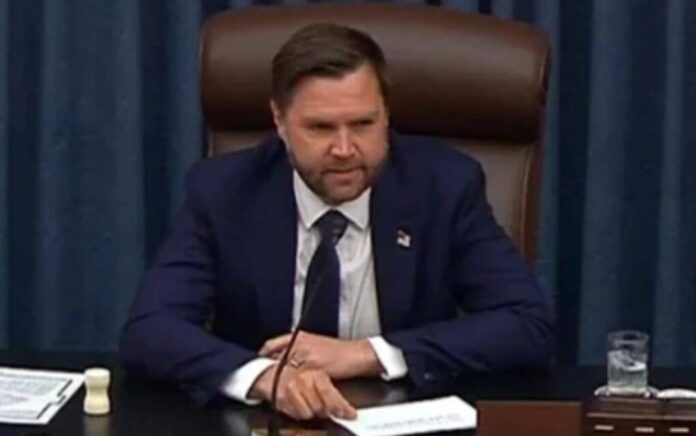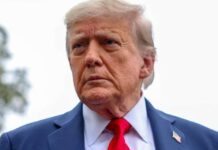
The Trump admin is playing a balance game around the world. One wrong move can mean total war.
And now J.D. Vance has pulled the curtain back on President Trump’s high-stakes decision-making.
Vice President Vance Champions New Foreign Policy
Vice President JD Vance delivered a powerful defense of President Donald Trump’s decisive military strikes on Iran’s nuclear facilities, framing the operation as a cornerstone of a revitalized American foreign policy. Speaking to a sold-out crowd at the Ohio Republican Party dinner on Tuesday, Vance hailed the bombing as “wildly successful,” emphasizing its precision and lack of American casualties, despite early intelligence suggesting limited damage to Iran’s nuclear program.
“Not only did we destroy the Iranian nuclear program, we did it with zero American casualties, and that’s what happened,” Vance declared to enthusiastic applause from the politically connected audience in his home state. The vice president’s remarks backed a confident narrative from the Trump administration, which has positioned the strikes as a masterstroke in curbing Iran’s nuclear ambitions.
Vance articulated what he called the “Trump Doctrine” during the dinner, outlining a clear strategy for U.S. engagement abroad. “What I call the Trump Doctrine is quite simple: Number one, you articulate a clear American interest and that’s, in this case, that Iran can’t have a nuclear weapon,” he said. “Number two, you try to aggressively diplomatically solve that problem. And number three, when you can’t solve it diplomatically, you use overwhelming military power to solve it and then you get the hell out of there before it ever becomes a protracted conflict.” The doctrine, as Vance described it, prioritizes swift, overwhelming action to protect national interests without entangling the U.S. in prolonged conflicts.
The strikes, dubbed Operation Midnight Hammer, have galvanized support among Republican loyalists, particularly in deep-red Allen County, where Trump and Vance secured a commanding 40-point victory in the last election. The room erupted in cheers multiple times during Vance’s speech, reflecting strong grassroots backing for Trump’s move. Candidates and elected officials in attendance praised the operation as a necessary step to safeguard global security.
However, the administration faced initial pushback from some within the GOP’s isolationist wing. Former White House adviser Steve Bannon questioned narratives suggesting the strikes aimed at regime change, while Rep. Marjorie Taylor Greene criticized “neocon warmongers” on social media. Despite their critiques, both reaffirmed their loyalty to Trump, highlighting the party’s trust for the president’s leadership.
Vance, alongside Secretary of State Marco Rubio and Defense Secretary Pete Hegseth, clarified on Sunday television appearances that the U.S. focused solely on dismantling Iran’s nuclear capabilities, not ousting its leadership. Yet Trump’s social media post later that day stirred confusion, stating, “if the current Iranian Regime is unable to MAKE IRAN GREAT AGAIN, why wouldn’t there be a Regime change???” White House Press Secretary Karoline Leavitt quickly clarified that Trump meant he “believes the Iranian people can control their own destiny,” aiming to quell speculation about anything otherwise.
The administration’s messaging has not been without challenges. Outside the Ohio dinner, about three dozen protesters gathered, wielding signs like “Ohio does not claim you” and chanting, “O-H, I-O, JD Vance has got to go,” borrowing a cheer from Vance’s alma mater, The Ohio State University. Undeterred, Vance dismissed suggestions from his chief of staff to cancel the appearance due to Middle East tensions. “Why the hell would we cancel a trip to Lima, Ohio?” he quipped, earning laughter and applause from the crowd.
On the international stage, Trump’s approach has drawn scrutiny. European nations condemned what they described as “threats” against the head of the UN nuclear watchdog, while Iran’s Foreign Ministry spokesperson, Esmaeil Baghaei, dismissed Trump’s shifting rhetoric on sanctions as “games” not aimed at resolving tensions. “These [statements by Trump] should be viewed more in the context of psychological and media games than as a serious expression in favor of dialogue or problem-solving,” Baghaei said at a press conference on Monday.
Trump, however, remained resolute. In a late-night Truth Social post, he rejected claims of negotiations with Iran, stating, “I am not offering Iran ANYTHING, unlike Obama, who paid them $Billions under the stupid ‘road to a nuclear weapon JCPOA (which would now be expired!), nor am I even talking to them since we totally OBLITERATED their Nuclear Facilities.” The post directly countered Senator Chris Coons of Delaware, who suggested on Fox News that Trump was exploring a deal reminiscent of the Obama-era Iran agreement.
Coons’ remarks, which referenced potential incentives and reduced sanctions, were swiftly dismissed by Trump, who on Friday denied reports that his administration considered aiding Iran with $30 billion for a civilian nuclear program. The president’s firm stance reinforced his commitment to a hardline policy, prioritizing strength over concessions.
Vance’s emergence as a key communicator for the administration highlights his growing influence within the Trump team. Once aligned with the GOP’s isolationist faction, the vice president has adeptly navigated the party’s internal dynamics to champion Trump’s actions. His ability to rally support in Ohio, a critical battleground state, clearly displays the administration’s focus on maintaining domestic backing for its foreign policy.
The Iran strikes mark a defining moment for Trump’s second term, showcasing his willingness to wield military power decisively. Vance’s articulation of the Trump Doctrine offers a clear framework of prioritizing American interests, exhausting diplomacy, and acting swiftly when necessary. This approach contrasts sharply with what the administration views as the failures of past policies, particularly the Obama-era nuclear deal.



















